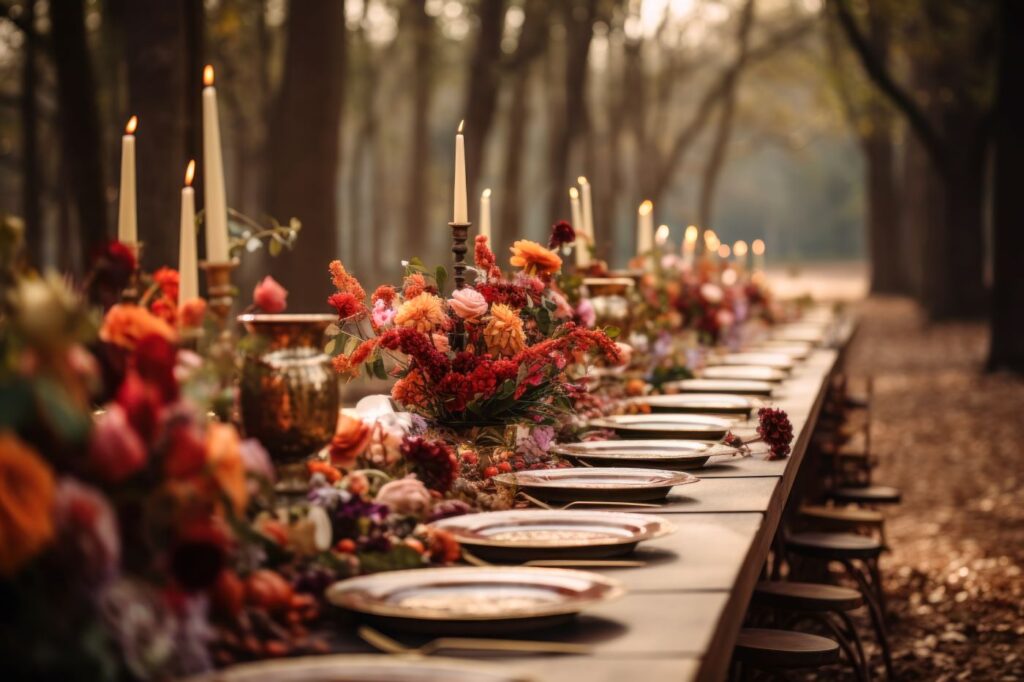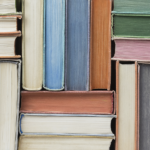The advance of autumn from October into November seems to leave behind Keats’s “season of mists and mellow fruitfulness” and become more elegiac. This eleventh month begins, for Catholics at least, with All Saints’ Day, immediately followed by All Souls’ Day—the first a day for those holy men and women (and children) for whose intercession we can pray, and the second a day to pray for all those who have gone before us who could use a little intercession.
A little over a week later comes Veterans Day, originally Armistice Day, marking the anniversary of the eleventh hour of the eleventh day of the eleventh month of 1918, when the shooting stopped in the First World War. In Britain and the Commonwealth nations they wear poppies (recalling John McCrae’s “In Flanders Fields”) and call it Remembrance Day, a very November kind of name. And near the end of the month, we Americans kick off the “holiday season” that carries through the end of the year by celebrating Thanksgiving on the fourth Thursday of the month.
Saints, the dear departed, veterans, remembrance, the giving of thanks. November is a month for looking back in gratitude at where we have been, where we come from, who has trod the boards of our stage before us. Gratitude is the proper spirit to lift us up during these shorter, colder days (at least in these latitudes), while the seasonal life of nature turns with the leaves and falls with them to the ground.
November is a month for looking back in gratitude at where we have been, where we come from, who has trod the boards of our stage before us.
Start your day with Public Discourse
Sign up and get our daily essays sent straight to your inbox.Staring the prospect of death in the face can concentrate one’s attention on what matters. As a young Navy pilot in 1944, George H. W. Bush, not yet twenty, had to bail out of his doomed aircraft (whose other crew members were lost) and spent several hours bobbing in a rubber raft in the Pacific until a U.S. submarine rescued him. More than forty years later, running for president, then–Vice President Bush recalled his thoughts as he floated alone at sea: “I thought about mother and dad and the strength I got from them—and God and faith and the separation of church and state.” Bush took a good deal of ribbing from commentators and rival candidates for what seemed an oddly political calculation, to claim four decades after the fact that he’d thought about “the separation of church and state” while his brief life passed before his eyes in the most dangerous hours he ever experienced. Perhaps he felt that he could not mention his faith without a disclaimer of sorts that he didn’t want to “impose it” on anyone. But in his awkward Bushian way, I think he was trying to say something about the value he placed on our constitutional arrangements as a country—a patriotic note alongside his thoughts about family and faith.
So herewith are some thoughts—and some books—suitable for November gratitude for family, faith, and service to our country.
I am thankful first for my parents, whose home was full of books and whose attitude in general was, “If we have it, you can read it.” As I said here last month, it is entirely appropriate for adults to control what children are permitted (let alone required) to read. But so far as I was ever able to tell, my parents never hid any of their books from me and my siblings or ruled any off-limits. If a book interested us, into it we would plunge. I distinctly remember (because it is tied to other events I can date) reading Leonard Wibberley’s comic novel The Mouse That Roared when I was ten. Not much later, as an adolescent, I was reading Joseph Heller’s Catch-22 and Mario Puzo’s The Godfather, moving on to Ian Fleming’s James Bond novels, and then discovering the golden age of science fiction (about which I’ve written before) in Anthony Boucher’s two-volume anthology A Treasury of Science Fiction. Mom had her mysteries and historical fiction, and Dad his spy thrillers and war stories: all were meat and drink to me.
Our paternal grandmother’s house had its peculiar delights as well, not least of which were the more than two dozen travel books written by my late grandfather Harry A. Franck, whose first book, A Vagabond Journey Around the World, was a smashing success in 1910 and sold well for decades afterward. Also in that house, among other antique leatherbound books, I found the novels of Alexandre Dumas, and then in my high school years came across my aunt’s college copy of a Victorian translation of Plato’s Republic. Rather foolhardily, I talked one of my high school teachers into letting me do an independent study paper on it. Mercifully, that paper is lost, for I’m afraid I did not understand the book very well before reading a better translation under a professor’s guidance in a college course a few years later. But it certainly piqued an interest in political philosophy that has never waned.
I am deeply thankful for my teachers, beginning with that professor who taught me Plato, Del Carlson of Virginia Wesleyan College, the best teacher I ever knew. He introduced me also to The Federalist, Tocqueville, and a wide array of political philosophers. In one course, he assigned a text edited by two men under whom I would later study, Morton Frisch (who would direct my doctoral dissertation) and Richard Stevens (who was both teacher and later a collaborator). The book was American Political Thought, a groundbreaking collection of essays on that subject, whose authors are still recognized as among the pioneers of the field: Martin Diamond, Herbert Storing, Harry Jaffa, Harvey Mansfield, Ralph Lerner, Walter Berns, Robert Faulkner, and Harry Clor. Their essays on figures such as Jefferson, Lincoln, Frederick Douglass, Woodrow Wilson, and FDR opened up a world of reflection on statesmanship of a uniquely American character.
Professors Frisch and Stevens, I came to learn as well, were both combat veterans of World War II, both teenage Jewish boys from Chicago (though strangers to each other until later years) when they enlisted respectively in the Army and the Navy. Frisch fought at Bastogne, and Stevens manned a gun against kamikazes on the deck of the USS Intrepid. Each returned home, sought an education on the GI Bill, and studied under Leo Strauss at the University of Chicago. I’m thankful for these humble heroes, these proud patriots, when Veterans Day rolls around every November. They spoke seldom if at all of their wartime experiences, especially the darker moments, but there was a fierce love of country in each of them that the education of the Spartans could not have etched more deeply in their characters. The idea that “liberalism” was doomed to fail was anathema to men who had seen their friends die for it, and they dedicated their careers to understanding its strengths and curing its weaknesses.
On Thanksgiving Day, of course, we must remember Whom we have to thank as well as what for. Our national holiday is inescapably a religious holiday.
On Thanksgiving Day, of course, we must remember Whom we have to thank as well as what for. Our national holiday is inescapably a religious holiday. So as I bob along on my own personal ocean, thinking of “God and faith and the separation of church and state,” I shall gratefully recall two men who embodied the best of American religious faith. The first is Michael Novak, whom I was fortunate to know in the final years of his life. Novak is probably best known for The Spirit of Democratic Capitalism, a book that quietly had its fortieth anniversary last year and should be more widely read today. But I have a soft spot for On Two Wings: Humble Faith and Common Sense in the American Founding, Novak’s 2001 account of the emphatically Christian liberalism of the American founding. He took his title from the opening line of Pope St. John Paul II’s 1998 encyclical, Fides et Ratio: “Faith and reason are like two wings on which the human spirit rises to the contemplation of truth.” The book is not flawless from the standpoint of historical scholarship, yet in the main, his thesis rings true: we cannot understand the American project if we view its founding as wholly a product of the secular Enlightenment’s enmity toward and privatization of religious faith.
Last of all, I will give thanks for a man to whom I was never introduced, but who nonetheless influenced the course of my life: Richard John Neuhaus, the Lutheran pastor turned Catholic priest who was the founding editor of First Things magazine. My wife was primarily responsible for bringing me back to the Catholic faith of my upbringing after many years of desert wandering. But even in those wilderness years, I had begun to take Neuhaus’s magazine, after first reading the column he had written for National Review. Father Neuhaus’s inimitable, charming voice, his evident reasonableness, and his spirit of both justice and charity were enormously appealing to me as (to vary the metaphor) a long ebb tide turned once again to a gentle flood bringing me back to the shore of faith. Nowhere are Neuhaus’s virtues on better display than in his final book, American Babylon: Notes of a Christian Exile. In these days when Israel fights for its life against the genocidal fury of Hamas, I turn to Neuhaus’s chapter “Salvation Is From the Jews,” and read these words: “When we Christians do not walk together with Jews, we are in danger of regressing to the paganism from which we emerged.”
Amen to that. And Happy Thanksgiving, everyone.
Image by Sunshower Shots and licensed via Adobe Stock. Image resized.














